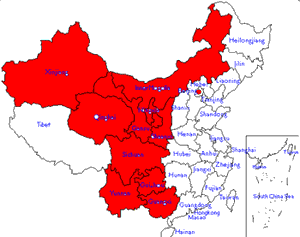Monitoring Social and Economic Development of Western China
Monitoring Social and Economic Development of Western China (MEDOW) is a large scale survey of living conditions for households in Western China. The project is financed by the Norwegian Foreign Ministry and developed and implemented as a part of the long-standing cooperation between the National Center for Science and Technology for Development (NRCSTD) based in Beijing, China and Fafo Institute of Applied International Studies in Oslo, Norway.
The aim of the Project
The project aims to establish baseline indicators of social and economic conditions for households in Western China, and thus contribute to the knowledge needed to be able to engage with some of the challenges faced by the Western regions of China. The survey is comprehensive and multi-topical and collects data on population, infrastructure, education, labor markets, health, household economy, agriculture and environmental conditions, as well as a number of other issues. Careful measures have been taken to integrate a full gender perspective to the survey and to make sure that all groups of the population are represented in the results (whether it is men, women, poor or ethnic minorities).
Size, Location and Time
MEDOW is one of the largest social science projects in China, conducted independently from the National Bureau of Statistics. The survey covers 167,000 individuals in 44,738 households situated in 11 provinces in western China. (Gansu, Xinjiang Uighur autonomous region, Yunnan, Ningxia Hui autonomous region, Guangxi Zhang autonomous region, Guizhou, Qinghai, Chongqing, Sichuan, Inner Mongolia autonomous region and Shaanxi). (Not Tibet).

The survey was conducted in the last part of 2004 and the first part of 2005, and the implementation involved more than 20 universities and more than 2000 local staffs, including students and staff from participating universities in West China. Two local headquarters were established at Nankai University in Kunming, Yunnan, and at Lanzhou University in Gansu.

Through close and valuable cooperation with local universities and thorough training of students and staff, the project has acted as an important tool for competence building in modern social sciences within academic milieus in Western China.
Method
The MEDOW survey is a relatively standard households survey that cover a large extent of topics and issues. The survey is conducted on household level, but includes information about all the individuals in the households. There is also an extensive survey of communities in which the sampled households live. For more information on the development of the questionnaires and the sampling frames go to: Questionnaires or Sample selection for the MEDOW survey
What are the results?
The results of the survey will be presented in different forms. Three printed volumes will be published: A Tabulation Report, A Socio-economic Atlas, and An Analytical Report., The Tabulation Report and the Socio-economic Atlas is available for purchasing, please contact for further information.
An overview and a small presentation of results are available for download from this site. "A Taste of MEDOW" presents some of the main findings in the Tabulation Report and the Socio-economic Atlas.
Use of the Survey results and References to the media coverage
The results of the survey have been used as background for several reports to the Chinese government and for new articles. Below is a small sample:
Chinese reports and publications
Special issue of the journal "Science and Technology in China" based on the results from the survey
Blue book of China's Society - Analysis and forecast on China's Social Development 2005 (In Chinese)
Reports to Leading Group on Poverty alleviation on infrastructure in the Western Provinces
Report to the Chinese Ministry of Health
-
Poverty Linked to Low Education for Western Chinese Women (China.org, 20.09.06)
-
A third of households in W China cannot afford middle school fees (China View, 27.09.06)
-
Promising future for west despite economic woes (China Daily, 04.01.06)
-
Most West China households think their economic situation has clearly improved (in Chinese) (cctv.com, 27.09.06)
-
Forskjellene øker mellom rik og fattig (LO-Aktuelt, 11.10.06)
-
Fafo presenterte levekårsundersøkelse fra Vest-Kina (Utenriksdepartementet, 11.10.06)
Prosjektperiode
-
Oppstart:januar 2004
-
Avsluttes:januar 2006



